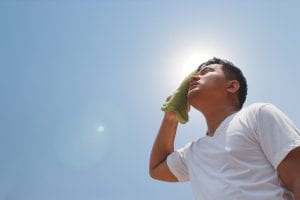
Heat waves have rippled across North America this summer, leading to an increase in heat-related illness and deaths.
Unfortunately, the data gathered on heat illnesses and deaths in the U.S. are incomplete. But we know that last year, extreme heat killed more people in the U.S. than hurricanes, floods, lightning, or tornadoes, according to the National Weather Service. This year, we’re on track to exceed the number of deaths due to heat.
Even if you don’t get sick in a heat wave, there is clear evidence that heat waves affect us all. In addition to leading to sickness and death, research shows extreme heat affects our ability to think and reason.
A systematic review published in the journal Human Factors takes a thorough look at how environmental factors—including heat, cold, high altitude, and being below sea level—affect cognition in members of the U.S. military. The review included 31 studies of heat stress.
Researchers found that heat stress impacted cognitive performance, especially at higher temperatures, during longer exposures and during more complex cognitive tasks. This was especially true when heat stress was combined with another factor, such as physical activity.
Participants performed worse on tasks that required accuracy and made more errors in communications tasks in warmer conditions. For example, in one study heat stress led helicopter pilots to deviate from their flight paths more often, increasing the chance of an accident or incident due to pilot error.
A second systematic review reached the same conclusion: heat stress significantly impacts people’s ability to complete complex cognitive tasks. This review found when participants felt hotter, less comfortable, and more irritable due to heat exposure, they performed worse on the complex cognitive tasks. This suggests each person’s individual response to heat exposure is an important factor to consider.
This review also found that cooling interventions, such as cooling packs placed on the skin and nutritional supplements to boost cognition, helped to alleviate some of the cognitive changes experienced during heat.
Other researchers are trying to quantify how heat exposure impacts learning among youth. A large, longitudinal study combines standardized achievement data for 58 countries and 12,000 U.S. school districts with detailed weather and academic calendar information to determine the impact of heat on academic performance. The study clearly demonstrates that students learned less when attending school during periods of hot weather.
For its first analysis, the study used data from a test designed to measure formal learning in math, science, and reading among 15-year-olds from 58 developed and developing countries. Students who experienced hotter temperatures in the school year leading up to the exam scored worse compared to their peers in the same county who attended school during cooler periods.
A second similar analysis looked at the standardized test scores of 12,000 U.S. students over several years. Researchers found that students scored worse during hotter school years compared to their peers in the same school district during cooler school years. This analysis also found that heat had a larger effect on younger students and on racial or ethnic minorities in lower-income school districts. This could be because they have fewer resources to adapt to hotter temperatures.
The take-home message: There is clear evidence that heat exposure impacts cognitive performance in adults and younger people—an issue that will affect an increasing number of people as the earth’s climate warms.


